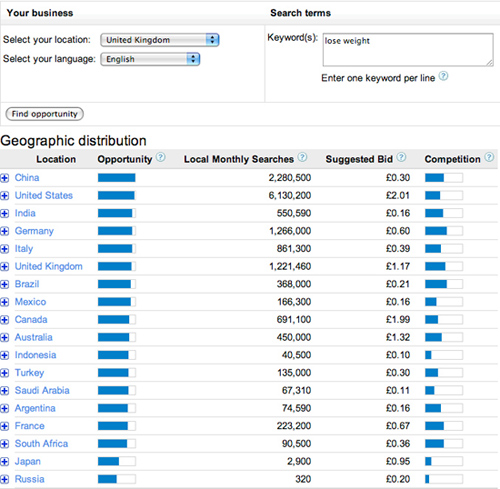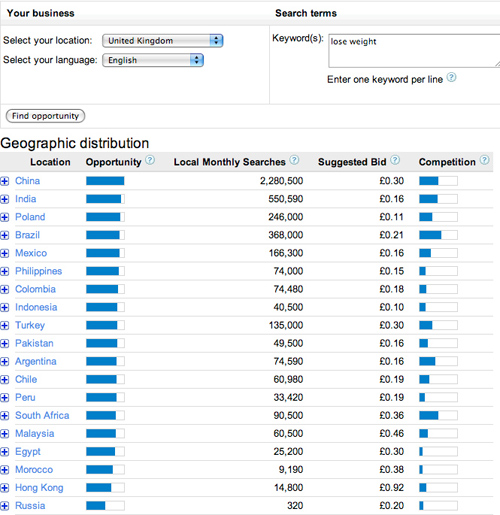More Lucrative Niches Exposed With Global Market Finder
Thanks to James Agate for this tip from the comments in the last post (Shouldn’t We Just Build Websites in Chinese?).
I was not at all familiar with Google’s Global Market Finder tool, until about 7 minutes ago. Maybe that has something to do with my own rocky relationship with Google, but I’m sure there will be many readers in the same boat.
Global Market Finder takes your keywords, translates them in to different languages, and examines the popularity and cost of those matches in various countries around the world.
Leading on from my last post, I think this is something that should prove super relevant for detecting trends and opportunities in countries that haven’t yet been saturated by competition.
I would certainly hesitate before staking my balls on the accuracy of Google’s data, but as a guideline to be used in correlation with other trends, it serves up some interesting information.
Once you’ve picked a keyword to research, you can compare data using the nine filters: Africa, Americas, Asia, Emerging Markets, Europe, European Union, G20, Middle East and Oceania.
Compare for example, the data of the G20 nations for a keyword like “lose weight” (and it’s many foreign equivalents), against an emerging market nation. The difference in bid prices is obviously significant, but will presumably narrow over the coming months and years.
G20 nations

Good volume but high click prices (suggests tough competition)
Emerging market nations

Decent volume, low prices... although currently, much less valuable traffic
‘Lose weight’ as a keyword may, understandably, take some time to catch on in countries like Indonesia where there isn’t half the obesity problem that we have on our hands in the west.
The real shocker on that list is Russia. Is it really the slimmest nation on Earth, or do their beached whales simply not give a shit?
Forgetting about Adwords altogether, we can use this tool to establish the demand for products in cultures that we might not be familiar with. You could spend an entire afternoon translating your keywords and measuring the search volume. But Global Market Finder does the chore of translation and comparison for you.
The incentive of knowing 380,000 Brazilians are looking to lose weight (every month) may just be enough to convince an affiliate marketer to dust down his Portuguese and rebrand those trashy landing pages.
“Finally, the acai berry comes home to Brazil.”
What about those of you who own digital products like ebooks? The brilliant thing about ebooks is that the cost of delivery is always the same.
There are many rapidly growing economies with consumers looking to flex their newly discovered purchasing power. If you can sell the same content, in a different language, to a willing market – surely it’s worth exploring?
Recommended This Week
Are you signed up to the Stack That Money Forum? It offers coaching from two of the best CPA bloggers in the biz, Mr Green and Mr Stackthatmoney. You’ll find a bunch of follow along case studies and some very generous knowledge dumps which you’d have to be an absolute muppet not to take value from. More info here.
If you’re a new reader, please add me to your RSS. Also follow me on Twitter Love you long time. Thanks for reading.

This is great for getting some new ideas, and I always encourage people to look internationally — especially since it takes much more work, in many cases, which weeds out 99% of people. However, this tool simply Google translates and then grabs the keyword info for the translated term, resulting in piss-poor accuracy that’s misleading at best. It’s a good start, but be sure to look deeper.
For example, for Brazil, “lose weight” get translated as “perder peso.” That’s one way to say it, and, yeah, people are searching for that. But use another, more common Portuguese word, and you get 1,830,000, considerably more than the 368,000.
What about Russia? That 320 number is hard to believe. Other, more common phrases display far juicier results — 550,000 for похудеть “grow thin”, 673,000 for диеты “diet”… Well, you get the idea. 🙂 And keep in mind that Google isn’t even the top search engine in Russia! Plenty of volume elsewhere, as well.
Heyoo… great article.
Trying to pickup the premium post and getting this error after submitting to paypal:
Bad Request
Your browser sent a request that this server could not understand.
Size of a request header field exceeds server limit.
Monies aren’t going through.
That’s strange. I’ve had sales going through around the same period. If it happens again, let me know and I’ll look in to it asap.
Cheers for the heads up
[…] usually Finch has posts that are worth reading. Here’s a handy global market finder. I greatly enjoy this 7 Deadly Sins of Dating ads […]